
Why Physicians Need to Embrace 'Good Enough' Financial Planning
Financial planning requires constant re-evaluation of many data inputs coupled with new assessments and actions.
While reading an article on problem solving recently, I came across the term “satisfice.” Coined originally by economist Herbert Simon, the term, a mix of the words satisfactory and sufficient, means that a judgment or solution to a problem is “good enough.”
A solution that satisfices is often the best answer to complex (also called ill-structured) problems and questions. Note that coming across a solution that is satisfice is not the same as a compromise. Instead it is a carefully considered solution involving intuition, intellectual capacity, and a body of knowledge and experience. As physicians, we often seek satisficient solutions in making a diagnosis or treatment plan.
A satisficient solution can also be applied when creating a financial plan. Variables including how much money one will earn, how much one will save, how markets and other investments will do over decades, what mistakes will be made, and what surprises are in store all confound the ability to create a foolproof and permanent financial plan.
Financial planning requires constant re-evaluation of the many data inputs coupled with new assessments and actions.
What I’m saying is that being successful in a financial plan is far from easy.
Yet it seems the majority of investors trust their assets to a cookie-cutter brokerage allocation, without having anyone determine the suitability of their investments to their personal goals and situations. Or, they plug into some online computer-based asset allocation software.
This is analogous to putting your symptoms and history into a computer program in order to diagnose an illness instead of having an intuitive and experienced physician listening and asking questions.
Having some experience in both finance and medicine, I can say that taking good care of one’s financial well being is perhaps harder than taking care of one’s general health.
In today’s well informed society, we “know” all the behaviors that are bad for us: smoking, large sugary drinks, fast food, no exercise, etc. The government even tries to protect us from ourselves with labels and proscribed foods.
But who is protecting us from bad investment decisions? The government itself is approaching insolvency, spending far more than it takes in. Any business running itself like the government would close quickly. Attempts to block predatory mortgage lending came much too late, and nothing is being done about wolves in investment costumes.
What we all need is a “satisficient” and ongoing set of decisions based on our individual situations and goals. It can be done yourself if you possess the time and experience to solve these complex problems. Or you can seek out skilled help and increase your chances of success.
Newsletter
Optimize your practice with the Physicians Practice newsletter, offering management pearls, leadership tips, and business strategies tailored for practice administrators and physicians of any specialty.








